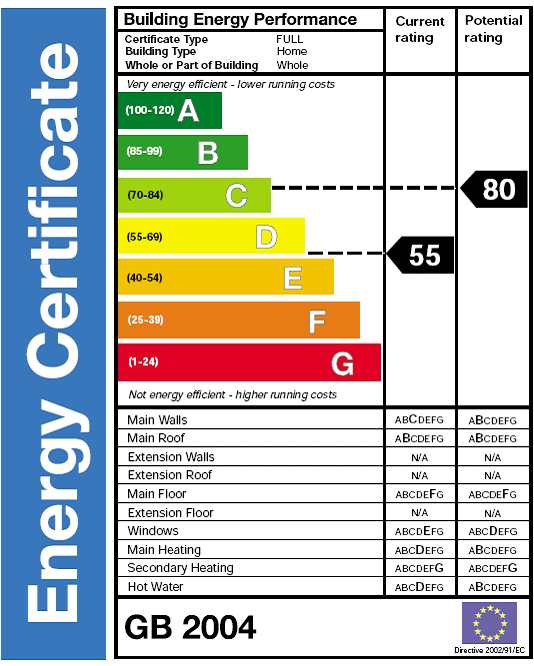People should be certain to consider the notions encompassing Qualified Domestic Energy Contractors when evaluating this particular concept.
A recent report by the UK Energy Research Centre claimed that “cost-effective investments to 2035 could save around one quarter of the energy currently used, an average saving of £270 per household per year at current energy prices.” When a potential buyer or tenant first makes an enquiry about a building or views the building they must be shown the EPC and recommendation report. This is the responsibility of either the seller or the agent acting on their behalf. Commercial EPCs are prepared using government approved IES (Integrated Environmental Solutions) software for your confidence. Assessors will conduct a site survey to identify your building’s rating based on factors such as the heating, lighting and ventilation. Alongside the EPC rating you will also receive a recommendations report, with actionable tips on how to improve energy performance and meet the minimum standards set by MEES regulations. A commercial EPC is similar to those produced for domestic dwellings and assesses the energy efficiency of a building. The commercial EPC provides advice on how you can make cost effective improvements to your building to make it more energy efficient. It provides a detailed report including information on pay back periods, energy saving imrpovements and graphs on energy consumption. Depending on the size of your property the survey can take anything from 20 minutes to 60 minutes to complete. It's a fairly simple assessment and quick to execute as long as the assessor has access to all the areas they need. You should receive the report within a few working days. It is accompanied by a recommendation report, which provides recommendations on how the energy performance of the building could be enhanced, together with an indication of the payback period.
Increasing energy efficiency not only allows individuals and organisations to reduce their capital and operational costs, is can also help lower fuel consumption and so reduce the emission of greenhouse gases and help prevent climate change. Much like school grades, the ratings on an EPC range from A to G. The most efficient rating is A and the least efficient rating is G. The only difference is that your property can’t fail an EPC, and the assessment isn’t carried out in complete silence (because, well, that would be weird). The time taken to perform an energy assessment will vary according to the size and nature of the property. This is particularly true of commercial buildings where the wide variations in size etc renders any definition of 'average time' not very meaningful. However, it has been estimated that an average three bedroom semi-detached house would take just under two hours to complete. Installing solar PV panels to generate energy on site helps with EPC ratings and much more effectively than wind turbines (which often feature in EPC recommendation reports, despite not being very effective for commercial property!). Although solar PV demands a higher outlay than most of the solutions detailed here, the payback can be compelling and ever more so with the unfortunate energy price hikes. A team of Energy Assessors and Chartered Surveyors are uniquely placed to give advice on non domestic epc register and provide a complete energy consultancy service.
The Responsibility Of Obtaining An EPC
All EPC’s are lodged with a central government register called the EPC register. Once in this site, you can search for any available EPC’s by selecting ‘retrieve report by using property address’ and enter the postcode. From here any EPC’s can be downloaded and are for public use. Commercial Energy Performance Certificates (EPC) are energy surveys that assess if a building or commercial property is energy-efficient or not. Commercial EPC ratings start from G (which shows least energy efficient), up to A which indicates most energy-efficient building possible. An EPC could prove beneficial, even if you are not planning to rent or sell your property. It is estimated that the residential sector is responsible for around 27% of the UK’s carbon emissions and so contributes significantly to climate change. The guidance provided in an EPC will enable you to make changes which will minimise the environmental impact of your home and reduce your fuel bills. EPCs are produced using standard methods and assumptions about energy use to enable the energy efficiency of buildings of the same type to be compared. They are valid for ten years but must be renewed if modifications to the property are made. For a commercial EPC, a qualified assessor will arrange a visit to the property and carry out a physical inspection of all the key components. The data collated from the site visit is processed using the Simplified Building Energy Model interface (iSBEM). Research around commercial epc remains patchy at times.Most of us are now familiar with the minimum energy efficiency standards (MEES) which came into effect in April 2018 and stated that new tenancy agreements and renewals (other than some HMOs such as bedsits) must have an energy performance certificate (EPC) rating of E or above. In April 2020, the standards were extended to cover all relevant properties, even those that had no change of tenancy. Like the domestic dwellings market, commercial buildings are also being assessed in far greater numbers, which is increasing transparency and making comparability a lot easier from building to building. The benefits of having a property with a good EPC rating is that it will be more comfortable to live in and have lower energy bills. You will also be eligible to access lenders that offer Green Mortages that have preferential interest rates. There is a lot of red tape surrounding the production of EPCcertificates and if homeowners are lacking particular documents or evidence needed to hit certain criteria points on assessment then the assessor is forced to leave certain information out of the certificate. It also doesn’t take in to account how the occupier uses the dwelling and how this can be influential on energy and environmental impact. Energy performance certification is a key policy instrument that can assist governments in reducing energy consumption in buildings. It provides decision makers in the buildings industry and the property marketplace with objective information on a given building, either in relation to achieving a specified level of energy performance or in comparison to other similar buildings. Conducting viability appraisals with respect to mees is useful from the outset of any project.
Useful Information About A Property
Almost all homes need and EPC, but that technical definition is that a building requires an EPC if it uses heating or air-conditioning. By definition, it uses energy to ‘condition an indoor climate’ i.e. between a roof and walls. All domestic and commercial buildings in the UK available to buy or rent must have an Energy Performance Certificate (EPC). If you own a home, getting an energy performance survey done could help you identify ways to save money on your energy bills and improve the comfort of your home. Under the MEES and EPC regulations, it is perfectly possible to have a commercial building let before April 2018 on a long lease that continues past April 2023, with an EPC of F or G and not need to do any energy efficiency upgrading works under the regulations, as long as the EPC expires BEFORE 1 April 2023. However, at the time when the building is sold or re-let, then a new EPC will be required and MEES will apply to the new letting or existing letting post April 2023. The EPC records the energy efficiency of a property, providing a rating of the energy efficiency and carbon emissions of a building on a scale from A to G, where A is very efficient and G is very inefficient. During an property inspection a number of recommendations to improve its energy efficiency will be identified (in the recommendation report which should accompany the EPC). Implementation of these could not only increase your rating and reduce carbon emissions, but also save money on energy bills. However, it is up to you whether you implement the recommendations or not; the Regulations do not impose a legal duty on you to do so. A well-thought-out strategy appertaining to mees regulations can offer leaps and bounds in improvements.Energy Efficiency (Private Rented Property) (England and Wales) Regulations 2015 also known as the minimum energy efficiency standards (MEES) set minimum standards for EPCs for private rented properties in England and Wales. The most important consideration with Commercial EPCs is the knowledge, experience, and creditability of the Commercial Energy Assessor. Poorly produced Commercial EPCs could make your Commercial premises unsalable or unlettable. As part of the government’s target to reduce emissions to net-zero by 2050, in April 2023 the property sector will be hit by the next stage of the rules on EPCs and Minimum Energy Efficiency Standards (MEES). It is a legal requirement to have a valid EPC for a property when marketing for sales and/or lettings. There are exemptions for certain property types, and all exemptions have to be registered on the national register. Each registered exemption is valid for five years. All non-domestic EPC’s must be performed by an accredited Low Carbon Energy Assessor and lodged on a central register. The Low Carbon Energy Assessor is also required to visit the site to verify the installation reflects the as-built information. After the survey, and on receipt of all as-built information, the EPC can then be lodged on the central register and will be issued. Advising on matters such as epc commercial property will provide benefits in the long run.
Designing Improvements
An EPC is issued and made available to the public on a national register and is valid for ten years. If you improve the energy consumption of your house with say a new boiler and new EPC should be done to reflect the improvement. MEES only applies to buildings occupied under a 'Relevant Tenancy'. This includes an assured tenancy, a regulated tenancy and domestic agricultural tenancies. If the occupier is present only under a licence to occupy the MEES requirements will not apply as there is no tenancy. Energy ratings on an EPC vary from A (most energy sufficient) to G (most energy inefficient). The EPC ratings should be better for newer properties than older buildings. A higher EPC rating could play a big role in making your commercial property more attractive to potential tenants. You can get more particulars about Qualified Domestic Energy Contractors in this UK Government Portal page.Related Articles:
More Background Findings On Commercial Energy Performance AssessorsMore Findings About Commercial and Domestic EPC Assessors
More Background Information On Commercial EPC Contractors
Supplementary Information With Regard To Accredited Energy Assessors
More Background Information About Commercial EPC Contractors
Further Insight With Regard To Low Carbon Energy Assessors
Background Insight On Non-Domestic Energy Performance Contractors







